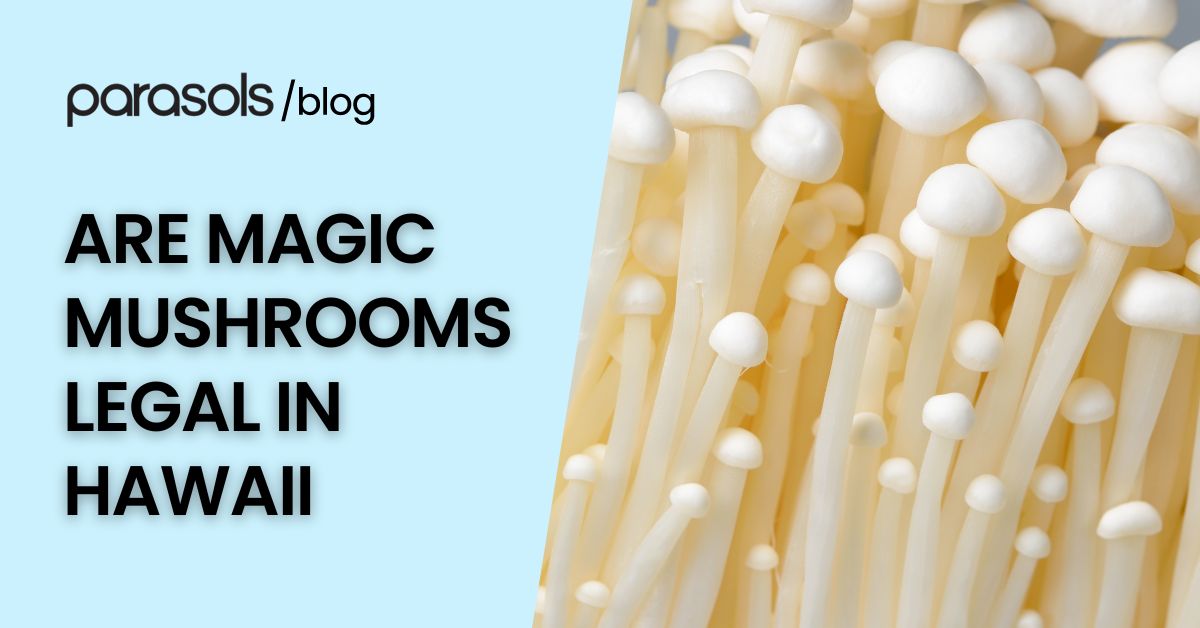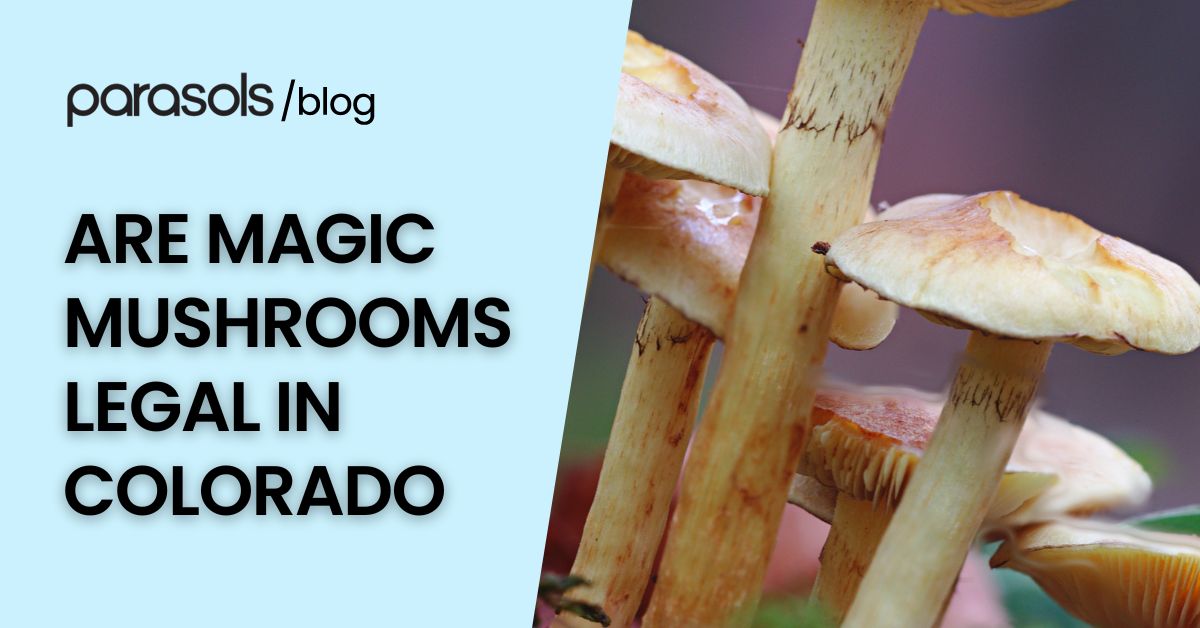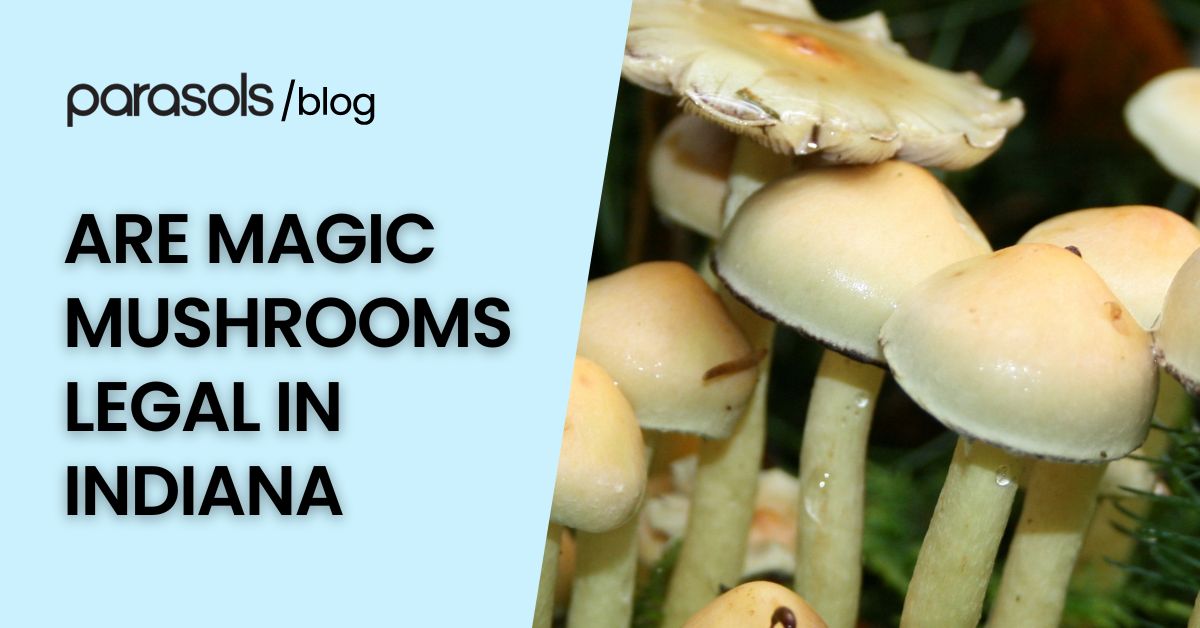Magic mushrooms, known for their psychoactive compound psilocybin, have drawn growing attention for their potential mental health benefits. In Hawaii, the legal status of these psychedelic substances remains complex and evolving, with state and federal laws, therapeutic research, and legislative efforts shaping the current landscape.
Magic Mushrooms Overview
Magic mushrooms, also called psilocybin mushrooms, are naturally occurring psychedelic plants known for their psychoactive effects. The key compound, psilocybin, affects perception, mood, and cognition by interacting with serotonin receptors in the brain.
Historically used in spiritual and healing practices, these mushrooms have gained renewed interest in modern medicine for their potential to treat mental health disorders such as depression, anxiety, obsessive compulsive disorder, and post traumatic stress disorder.
Are Magic Mushrooms Legal in Hawaii?
No, magic mushrooms are not legal in Hawaii. Psilocybin, the active compound in these mushrooms, is classified as a Schedule I controlled substance under both federal and Hawaii state law, making its possession, cultivation, and distribution illegal.
While there have been legislative efforts to permit therapeutic use of psilocybin for certain mental health conditions, such as post-traumatic stress disorder and treatment-resistant depression, these proposals have not yet been enacted into law. Therefore, as of now, psilocybin remains illegal in Hawaii.
Current Laws on Magic Mushrooms in Hawaii
Hawaii's legal stance on magic mushrooms is evolving, particularly as interest grows in their therapeutic potential. Below is a breakdown of current laws and recent developments.
Psilocybin as a Controlled Substance
Psilocybin is classified as a Schedule I controlled substance in Hawaii, mirroring its federal classification. This means it is currently illegal to possess, cultivate, or distribute psilocybin mushrooms. Penalties for violations can be severe, depending on the quantity and circumstances, ranging from fines to long prison sentences.
Legislative Efforts for Therapeutic Use
In 2022, Hawaii's Senate approved the creation of a psilocybin task force to study the therapeutic uses of psilocybin and recommend a regulatory framework for future access, especially for qualified patients with mental health conditions.
House Bill 2630, introduced in early 2024, seeks to allow the medical use of psilocybin for conditions like post-traumatic stress disorder, treatment-resistant depression, and other mental health disorders. The bill includes provisions for the involvement of licensed mental health professionals and outlines safety protocols for therapeutic treatment.
Senate Bill 3019 proposes the establishment of a structured program for therapeutic psilocybin use. It outlines patient eligibility criteria, training requirements for facilitators, and a framework for therapeutic sessions involving psilocybin under professional supervision.
Pilot Program for Psychedelic-Assisted Therapy
In 2025, Hawaii passed a measure to create a two-year pilot program to study psychedelic-assisted therapy, including psilocybin. The program will collect data on the medical use of certain psychedelics, particularly their role in treating serious mental health conditions such as eating disorders, obsessive compulsive disorder, and end-of-life anxiety.
Consequences for Usage of Magic Mushrooms in HI

In Hawaii, the use of magic mushrooms—specifically those containing psilocybin—is illegal and subject to strict penalties. While there is growing support for therapeutic research and reform, the current legal framework enforces severe consequences.
- Possession: Possessing psilocybin mushrooms is a Class C felony. Individuals found with any amount can face up to 5 years in prison and fines reaching $10,000.
- Distribution or Sale: Selling or distributing psilocybin is classified as a Class B felony, carrying penalties of up to 10 years in prison and fines as high as $25,000.
- Cultivation: Growing psilocybin mushrooms is illegal in Hawaii. Although mushroom spores are legal to possess, cultivating them into fruiting bodies constitutes an offense.
- Use: Using psilocybin may lead to felony charges. Convictions can result in up to 1 year of imprisonment and fines up to $2,000, depending on the circumstances.
- Legal Distinctions: Hawaii law makes no exception for personal use versus intent to distribute. Any act involving psilocybin—including possession, use, or cultivation—is treated as a criminal offense.
Future Outlook for Shrooms in HI
The future of magic mushrooms in Hawaii shows cautious progress, with lawmakers studying regulated therapeutic use. In 2025, the state approved a two-year pilot program to study psychedelic-assisted therapy for conditions like PTSD and treatment-resistant depression.
Hawaii also formed the Breakthrough Therapies Task Force to guide safe and effective use of substances like psilocybin. While recreational use remains off the table, these steps reflect a growing openness to the medical and therapeutic potential of psychedelic medicine.
Magic Mushroom Alternatives in Hawaii
While psilocybin remains illegal in Hawaii, there are several legal alternatives for individuals seeking support for mental health conditions. These options are available within the boundaries of current laws.
- Ketamine-Assisted Therapy: Ketamine is legally administered in clinical settings across Hawaii to help treat conditions such as treatment-resistant depression, PTSD, and anxiety. It is typically used under strict medical supervision.
- Integration Coaching and Psychedelic Support Services: Holistic wellness providers in Hawaii offer non-drug-based services like psychotherapy, mindfulness training, and integration coaching to support individuals working through trauma or preparing for future psychedelic therapy.
- Psychedelic Retreats (Outside Hawaii): Although substances like ayahuasca are not legal in the U.S., some individuals choose to attend psychedelic retreats abroad in countries where these practices are permitted. These retreats focus on guided healing and personal growth.
- Community Advocacy and Education: Local groups and organizations advocate for the safe, therapeutic use of psychedelics and educate the public about responsible practices. They also provide community support for individuals seeking alternatives or preparing for future policy changes.
Final Thoughts

In Hawaii, magic mushrooms remain illegal, yet the path toward regulated therapeutic use is steadily gaining traction. As lawmakers study reforms and mental health professionals highlight the need for breakthrough therapies, the conversation around psilocybin is shifting.
For those seeking safe, legal options now, alternative treatments and support services are available across the state. Stay informed and involved—your awareness plays a part in shaping Hawaii’s evolving approach to psychedelic medicine.
Frequently Asked Questions
Can psilocybin be prescribed by doctors in Hawaii?
No, doctors in Hawaii cannot legally prescribe psilocybin, as it is classified as a Schedule I controlled substance with no recognized medical use under current law.
Is it legal to possess psilocybin mushroom spores in Hawaii?
Yes, psilocybin mushroom spores can be legally possessed in Hawaii as long as they are not cultivated or used to grow mushrooms, which would be illegal.
Are there any religious exemptions for psilocybin use in Hawaii?
Currently, there are no recognized religious exemptions that allow for legal psilocybin use in Hawaii, although some federal cases have tested religious use defenses in other states.
Can tourists face charges for psilocybin possession in Hawaii?
Yes, tourists are subject to the same drug laws as residents. Possession, use, or distribution of psilocybin mushrooms while visiting Hawaii is illegal and can result in felony charges.
How are law enforcement priorities shifting on psychedelics in Hawaii?
Some advocacy groups have pushed for making psilocybin possession the lowest law enforcement priority, but this has not yet been adopted into official policy statewide.
What’s the difference between decriminalization and legalization?
Decriminalization typically reduces or removes criminal penalties for possession and personal use, while legalization establishes a legal framework for production, distribution, and medical or recreational use.
Are there ongoing clinical trials for psilocybin in Hawaii?
There are no publicly confirmed large-scale clinical trials specifically for psilocybin in Hawaii at this time, but smaller research efforts may be supported through the pilot program and therapeutic task force initiatives.
Could Hawaii follow the path of Oregon or Colorado on psilocybin?
It’s possible. While Hawaii has not yet enacted laws like those in Oregon or Colorado, legislative trends and public interest suggest the state is monitoring these models closely as it considers its own path forward.



Leave a comment
This site is protected by hCaptcha and the hCaptcha Privacy Policy and Terms of Service apply.